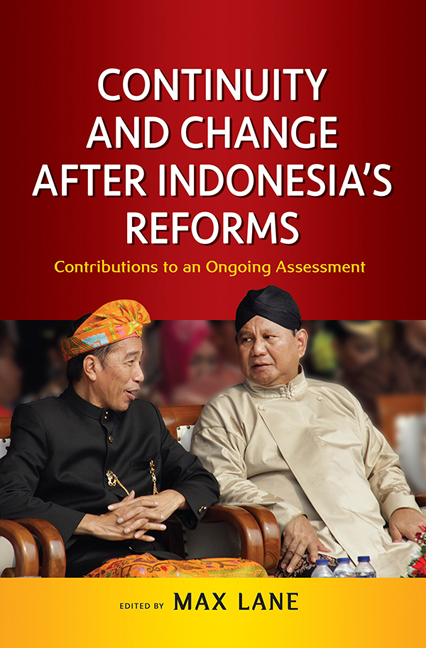Book contents
- Frontmatter
- Contents
- Preface
- About the Contributors
- 1 Indonesia's New Politics: Transaction Without Contestation
- 2 Indonesian Parties Twenty Years On: Personalism and Professionalization amidst Dealignment
- 3 Ideologies of Joko Widodo and Indonesian Political Parties
- 4 Political Islam Movements and Democracy in Indonesia: A Changing Landscape?
- 5 Creating Leadership Legitimacy in Post-Reform Indonesia
- 6 The Political Middle Class in Post-Soeharto Era Indonesia
- 7 The Politics of Centre–Local Relations in Contemporary Indonesia
- 8 The Roots and Actors of Corruption in the Political Realm
- 9 Why Is It Really Hard to Move On? Explaining Indonesia's Limited Foreign Policy Reform After Soeharto
- 10 Papua under the Joko Widodo Presidency
- 11 Youth “Alienation” and New Radical Politics: Shifting Trajectories in Youth Activism
- Index
4 - Political Islam Movements and Democracy in Indonesia: A Changing Landscape?
Published online by Cambridge University Press: 06 September 2019
- Frontmatter
- Contents
- Preface
- About the Contributors
- 1 Indonesia's New Politics: Transaction Without Contestation
- 2 Indonesian Parties Twenty Years On: Personalism and Professionalization amidst Dealignment
- 3 Ideologies of Joko Widodo and Indonesian Political Parties
- 4 Political Islam Movements and Democracy in Indonesia: A Changing Landscape?
- 5 Creating Leadership Legitimacy in Post-Reform Indonesia
- 6 The Political Middle Class in Post-Soeharto Era Indonesia
- 7 The Politics of Centre–Local Relations in Contemporary Indonesia
- 8 The Roots and Actors of Corruption in the Political Realm
- 9 Why Is It Really Hard to Move On? Explaining Indonesia's Limited Foreign Policy Reform After Soeharto
- 10 Papua under the Joko Widodo Presidency
- 11 Youth “Alienation” and New Radical Politics: Shifting Trajectories in Youth Activism
- Index
Summary
Introduction
Confronted with the gradual advance of democratic discourse and institutions in post-reformasi Indonesia, Indonesian political Islam movements — ranging from Front Pembela Islam (Islam Defender Front, FPI), Hizbut Tahrir Indonesia (HTI), Majelis Intelektual dan Ulama Muda Indonesia (Indonesian Council of Young Intellectual and Ulama, MIUMI), Wahdah Islamiyah, to Forum Umat Islam (Islamic Community Forum, FUI) — have been compelled to readjust their strategies to ensure their adaptation to the new political landscape. Although they initially conceived democracy as harmful and incompatible with Islamic faith, political Islam movements have gradually adopted various strategies that enable them to enter the democratic arena and be recognized as legitimate players within it. They have attempted to demonstrate stronger compliance with democratic norms and rules and make several adjustments in their ideological stance —especially on the relationship between Islam, democracy, pluralism, and the nation-state — to justify those strategies.
However, the desire to retain conservative aspirations — such as the rejection of the election of non-Muslim leaders, support the ban on religious minority groups, and persecution against the LGBTQ+ community — remain strong among political Islam activists. Their strategies mainly revolve around attempts to widen their access to state power or to push the state to create conditions favourable for the growth of conservative ways of life. The tension between political Islam's engagement with democracy and its insistence on a conservative agenda subsequently creates a situation where conservative ideas are increasingly articulated through democratic avenues.
The manoeuvre of political Islam movements to enter the democratic arena is crucial because the groups were previously excluded from the centre of Indonesia's national political arena through the continuous argument by pro-democracy activists, government, and international donors that political Islam threatened democracy, pluralism, and national unity. By implication, so this argument goes, they should not be considered as legitimate players in democratization. The decision of political Islam movements to adopt democratic rhetoric, as part of its efforts to win control over democratic institutions, is intended to overcome its exclusion.
Compared to political Islam's preceding strategies, their recent manoeuvre is relatively novel. Prior to this, the movements tended to distance themselves from the state. It was only during the last decade of Soeharto's administration that these groups acquired a wider access to the state. Prior to the 1990s, political Islam had to avoid political activism due to New Order persecution.
- Type
- Chapter
- Information
- Continuity and Change after Indonesia's ReformsContributions to an Ongoing Assessment, pp. 78 - 112Publisher: ISEAS–Yusof Ishak InstitutePrint publication year: 2019

